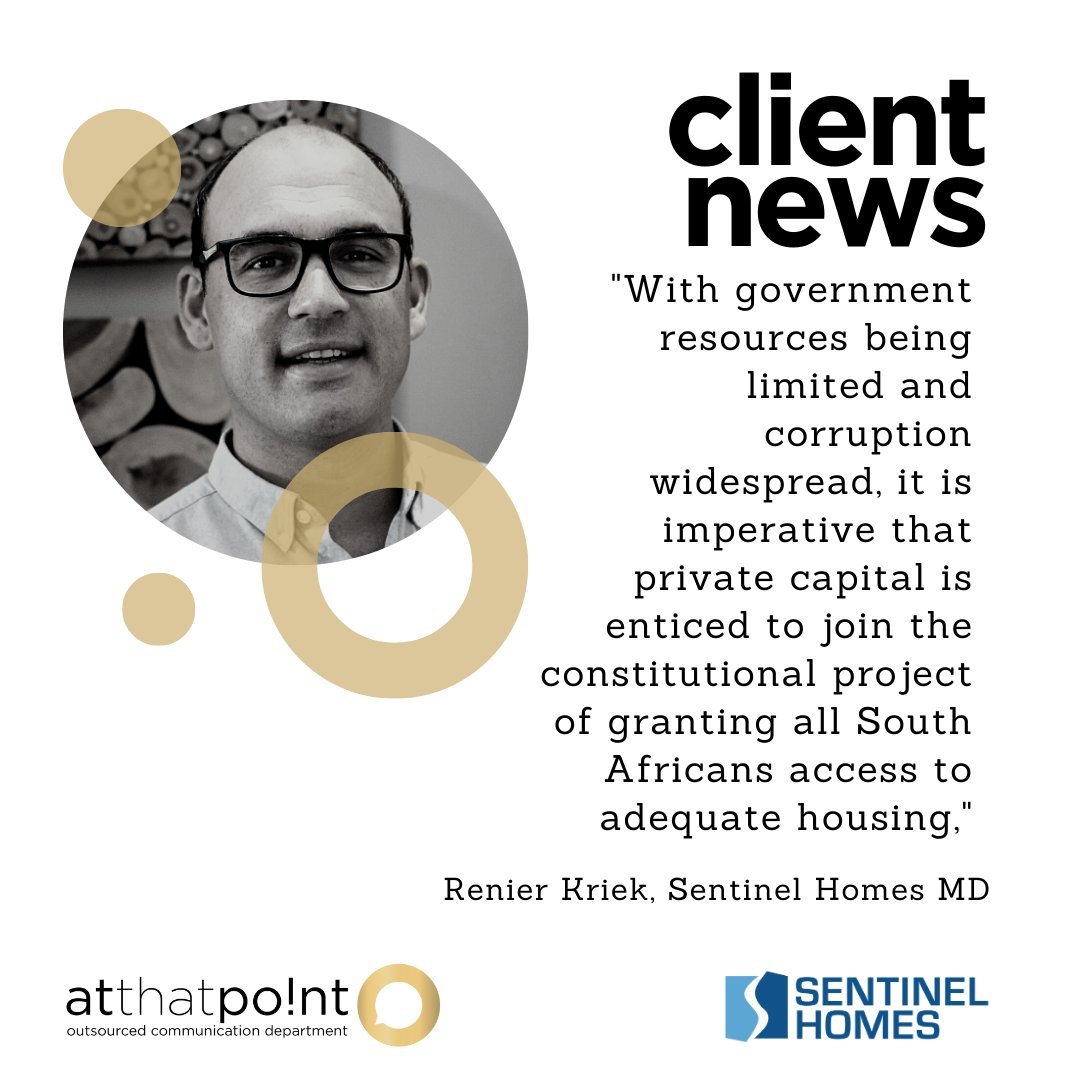|
The significant decline in the number of people who can keep their mortgage accounts up to date clearly illustrates the level of financial distress consumers are currently experiencing.
Historically around 92% of all mortgage accounts were up to date, but it has been dropping quite dramatically in recent times. The latest available figure shows it is down to 88% in the last quarter of 2023. That means home loan accounts with arrears have increased by about 50% recently, and it happened in the relatively short time span of 18 months to December 2023. Globally inflation has been quite stubborn and interest rates remain high as a result. In South Africa the repurchase rate (repo rate) of the South African Reserve Bank reached its highest level in 15 years, says Renier Kriek, managing director of Sentinel Homes. This means the prime rate, used to price home loans and other consumer debt like car loans and credit cards, is elevated. High inflation, and the high interest rate response, has been caused by a confluence of factors including the hangover from previous quantitative easing, supply-chain bottlenecks during the Covid-19 pandemic, the Russia-Ukraine war and the recent conflict in the Middle East. Despite earlier predictions that the high interest rate cycle could turn around in May this year it is now only expected next year due to high inflation proving stickier than anticipated. “Being unable to afford your home loan instalment is not a position anyone wants to find themselves in. Steer your own boat rather than leaving it to the vagaries of the foreclosure process. Not taking control of the situation can be financially disastrous,” advises Kriek. Prevention better than cure He urges homeowners to come to an agreement with their home loan credit provider before they miss the first payment. Stick to the arrangement. Do not over-promise and under-deliver. “If you couldn’t make an arrangement in advance of missing a payment, and you’ve already fallen into arrears, pay something toward the debt immediately. Just pay anything you can and keep on doing that as a launchpad for negotiations with your home financier.” Accounts that are receiving payments are less likely to face hand-over and foreclosure than accounts receiving no payments. “Do not let unreasonable hope be the enemy of your future financial well-being,” he adds. If the cause of your financial distress is unlikely abate within a reasonable time, call it a day and list the property for sale with an estate agent. Be realistic and pro-active. He recommends that distressed homeowners market their property before the home financier’s attorneys come knocking, ensuring a better return on the sale. “You will also avoid a slew of additional costs once the bank starts with the foreclosure process. These only serve to make your poorer, adding insult to injury.” Some people, particularly men in Kriek’s experience, tend to be too proud to discuss financial matters with family and friends. Many families are caught by surprise when there is suddenly talk about foreclosure, having missed the opportunity to assist along the road. “Reach out to the people you love and trust, there may be a lifeline from someone who will understand your circumstances and can assess the situation with much higher fidelity than a remote credit provider.” Forbearance before foreclosure Credit providers may be willing to assist a distressed homeowner by offering a payment holiday or by granting an interest-only period. It may also be possible to spread any existing arrears over a few months ‘repayments or extending the term of loan. This is especially true when the bar to payment is temporary, such as hospitalization or sudden retrenchment It is also important for consumers not to fall prey to over-enthusiastic debt counsellors. Many unscrupulous operators in that industry market debt counselling as a cure for all debt related ills. Entering debt counselling may not, in fact, save your home, but may still have a potentially disastrous effect on your future finances. For instance, debt review stops you from taking any new debt for several years while the debt review is completed. Kriek says there is a general misconception that home loans are “money-spinners” for home loan companies such as the banks. It only takes a couple of missed payments for home loan provider to be “under water” with a home loan. Do not labour under the misapprehension that you are doing the bank a favour by having a home loan with them – the home loan itself is not a very lucrative proposition. Nevertheless, the fixed costs of originating new home loans are quite high. Banks, home loan or credit providers generally prefer to rehabilitate existing customers rather than terminating the agreement, foreclosing, and then having to originate new debt. Take all opportunities to steer your own boat off the foreclosure rocks. Your finances cannot afford to be shipwrecked there. ENDS MEDIA CONTACT: Rosa-Mari Le Roux, [email protected], 060 995 6277, www.atthatpoint.co.za For more information on Sentinel Homes please visit: Website: www.sentinelhomes.co.za Facebook: Sentinel Homes
0 Comments
 This year, almost half of the world's inhabitants will head to the polls to elect their new governments, including 8 of the world’s 10 most populous countries. "In South Africa, we can expect our own election to put the property market into a temporary holding pattern, dragging on the subtle buyer’s market we have been experiencing" says Renier Kriek, Managing Director at Sentinel Homes. While he advises owners to wait until the end of the year to consider selling their property, Kriek cautions buyers to not get caught up in election fears and miss out on real estate bargains. The impact of sentiment All market behaviours are driven by sentiment. South Africans face uncertainty around the outcome of the election and the likelihood that, for the first time in its history, the country will be led by a coalition government at the national level. This creates negative sentiment that is also being fuelled by the heightened and increasingly populist rhetoric of competing political parties. And persistent factors, like the delay in interest rate cuts and a declining rand, only add to the doubt. "While we were all hoping for a downturn in the rate cycle at SARB's May or July meeting, I now doubt anything will happen before September. The MPC remains hawkish and seem unlikely to move interest rates down before the US Federal Reserve has lowered their policy rate," says Kriek. That's expected well after the election and these compounded concerns are pushing people to take a wait-and-see approach, including in the buying and selling of property. A first for South Africa All countries with a proportional representation electoral system eventually face a coalition government scenario. The likelihood of a national governing coalition is therefore a sign that our political system is maturing. This will be South Africa's first coalition government at a national level and the norms associated with such a structure have never been firmly established among the political class or the voting population. While national coalitions are a sign of progress and maturity, it is likely to lead to a lot of short- to medium-term noise, that is likely to have a continuing and unpredictable impact on sentiment in all markets, including the property market. The nearest we have to some agreement is the Multiparty Charter whose only purpose is to counter a national coalition between the ANC and EFF. Countries like Belgium with older proportional representation systems have developed the advanced bureaucracy necessary to almost run the country on autopilot, even without a government. South Africa, however, still needs to find its footing in any coalition pacts and develop the necessary protocols among participants intent on promoting their own interests. "This means things will probably be noisy and messy for some time after the election, as parties attempt to nail down the terms of their respective alliances," says Kriek. What to expect from property Currently, it's still a buyer's market for property and it definitely won't turn into a seller's market until after the election and a rate cut. Until then, we can expect that property price growth will remain low. Once the election outcome is known, and provided we have avoided worst-case scenarios, and the rate cut is at hand, we can expect pent-up demand for property to spill into the market and significantly increase demand. In addition, weak economic growth means sellers who can afford to wait should indeed wait until spring or summer to see if they can fetch a good price for their property relative to the market. Winter is historically not a great time for selling homes anyway. Despite the general modd brought on by politics and the interest rate cycle, the market in the Western Cape remains buoyant and there are signs of buyers returning in earnest to areas like southern Gauteng and areas eastof Pretoria. The smart money of property investors also remains in the market, signalling that opportunities exist. Along with low property price growth, this means that astute buyers can still pick up bargains while others hesitate. "If you want to buy, buy now and don't be put off by sentiment-driven hesitance that currently prevails in the market election sentiment," advises Kriek. “In the South African property property market, due to structural factors, what goes down must eventually come up.” ENDS MEDIA CONTACT: Rosa-Mari Le Roux, [email protected], 060 995 6277, www.atthatpoint.co.za For more information on Sentinel Homes please visit: Website: www.sentinelhomes.co.za Facebook: Sentinel Homes  There is a major surge in investment in buy-to-let properties across South Africa, with the Western Cape leading the pack. "We're seeing a 15 year high in national investment applications, which rose to 11.8 percent of all applications by the last quarter of 2023," says Renier Kriek, Managing Director at Sentinel Homes, who bought his first investment property at 19 and has been investing in residential property ever since. Usually, this figure is around 5 percent. Kriek is quoting recent ooba Home Loans market data which also puts investment applications in the Western Cape at a whopping 28.2 percent of total applications. "The housing demand in the province is enormous and property investors are obviously taking note," says Kriek. Investors, not home buyers Home buyers are hesitant to buy right now due to uncertainty around the upcoming election, as well as the rising cost of living caused by inflation and high interest rates. This could mean current data may be skewed by their lower participation, making investment applications appear greater as a percentage. Even so, it also indicates that property investors remain confident, active in the market, and resilient regardless of economic pressures. Property investment may also be seen as more secure in the current uncertain political climate. Why is property investment vibrant? One reason is the ongoing trend of semigration, with South Africans flocking to areas offering better infrastructure and service delivery. This is especially true of the Western Cape where new property development lags the influx of semigrants. Many coming to the province now rent while searching for a new home or while theirs is being built. Another reason is the return of tourists to Cape Town, still one of the top holiday destinations in the world. Investors are already snapping up prime properties they can rent out as short-term leases and holiday accommodations. The increased demand for rentals and improving performance in rental properties, including lower vacancies and tenant defaults, is driving the wave of buy-to-let investment applications. Tips for investors So, if people are serious about investment buying, does Sentinel Homes have any tips for them? "Indeed, we do," says Kriek.
New and experienced investors alike can benefit from Krieks advice. ENDS MEDIA CONTACT: Idele Prinsloo, [email protected], 082 573 9219, www.atthatpoint.co.za For more information on Sentinel Homes please visit: Website: www.sentinelhomes.co.za Facebook: Sentinel Home  The local property market will see a resurgence in 2024 predicts Renier Kriek, Managing Director at Sentinel Homes. "People have been held back from buying and selling property by various factors since before the COVID lockdown, but that is about to change for the better," he says. Factors impacting the local property market In South Africa, property buying and selling have dropped steadily since 2021. In 2023, market volume was about 5% lower than 2019. The factors driving this decline include load shedding, the national logistical backlog, a stalling economy, runaway inflation, the rising cost of living, and a 475 basis point increase in the lending rate since the COVID lockdown ended. However, people's life circumstances continue to change, suggesting pent up demand building below the surface. The number of first time buyers – a solid indicator of market demand – has also decreased significantly, again implying that unsatisfied demand exists. Outlook for 2024 Two main events signal that things are about to change. First, economists agree that, as inflation slows in South Africa, SARB will likely reduce the interest rate at its May or July National Planning Commission meeting in line with the US Fed. Second, the country will hold general elections this year, and probably be led for the first time by a coalition government at national level. While this might concern South Africans, it also promises to bring new energy to solving the nation's dilemmas. Kriek believes both these events will turn out well and will provide a release for the evident demand for property. "Then, we'll see a dramatic increase in market activity," he says. Several lesser trends are also worth watching. Smart money in the market Right now, there's a lot of smart money in the market – entities that buy properties to boost their portfolios, not their lifestyle. Interest rates on mortgage loans have decreased significantly, partly because banks are competing for a shrinking market, but also because these investors are richer, have better credit records and present a much lower risk than the average buyer. They are also paying higher deposits up to 105 percent. In the same vein, wealthy buyers from abroad are snapping up luxury properties in Cape Town above R20 million. This trend is sure to continue into 2024 as that smart money looks to acquire more assets before the market turns. Semigration Semigration remains a major trend in 2024 and smaller towns will continue to be targeted for gentrification, no longer only in the popular Western Cape but across the country. As more affluent buyers seek stock in these locations, incumbents will see their property value rocket. This may not be the only incentive for them to sell, though. Increases in rates and the cost of living may become unaffordable for them, pressuring them to move elsewhere. But where will they go? With more than 80 percent of all building plan approvals being in coastal areas currently, the answer is plain to see. Co-buying There is a marked increase in co-buying, that is, people buying a property together with someone other than their spouse. This includes friends, unmarried couples, investors and those with business intentions. About one in every four properties purchased is now co-bought. This approach overcomes the gap between property prices and income, and is a way for younger people to enter the market while spreading risk between them. Banks have also changed their policies to accommodate co-buying, with some allowing up to 12 individuals to join in the application. Buy-to-let boom The buy-to-let market is booming, especially in the Western Cape. One reason is that, due to insufficient stock and higher property prices at the coast, many semigrants rent while they shop around for an affordable property or while their new home is being built. This growing demand provides a good incentive for buy-to-let landlords to invest in new homes and apartments, despite the high construction costs. Almost 11% of all bond applications are currently investment purchases. Smaller properties Another continuing trend in 2024 will be smaller plots and smaller properties. High construction costs make it very difficult to create new stock that competes with existing stock in the market. So, both tenants and buyers will have to adapt to reduced living space unless they can afford to build their own at a premium. Relief for homeowners The number of buyers may be low but owners are also holding onto their properties for dear life, in the face of crippling interest rates. Unfortunately, foreclosure may have forced some to sell. Yet, the predicted drop in interest rates promises relief to those who managed to stay afloat. It could also mean an influx of buyers for anyone who desperately wants to unburden themselves of their property. When will the change happen? Kriek expects the dam to break in the coming winter. This is not a prime time for property sales, however, especially in the Western Cape. During this season, people tend to buy fewer properties or buy them at a reduced rate. "With lower transaction volumes during the winter months, there is likely to be a slight buyer's market that will turn to a seller's market in spring," he says. ENDS MEDIA CONTACT: Rosa-Mari Le Roux, [email protected], 060 995 6277, www.atthatpoint.co.za For more information on Sentinel Homes please visit: Website: www.sentinelhomes.co.za Facebook: Sentinel Homes  Everyone buying a home would like to know that they are getting good value for money. Buying a property that is good value for money is not easy but is achievable for those who are astute and are willing to be patient and remove as much emotion from the decision as possible. The first important mindset shift is that buyers must not confuse value with price. “Just because you were able to negotiate a reduction in the asking price does not make it a bargain. The price likely was inflated to begin with, because there are many incentives favouring higher listing prices,” says Renier Kriek, Managing Director of Sentinel Homes. True bargains have some distinguishing characteristics to look out for. This includes:
Home seekers on the lookout for a bargain must remain alive to illegal construction. “The risk associated with illegal building work is almost always not worth the discount on the price,” says Kriek. If there are any doubts about the structural integrity of a building, call in the professionals to do an inspection. The benefit of a qualified home inspector, especially to inexperienced buyers, cannot be overstated. Since kitchens and bathrooms are the most expensive parts of any residential properties carefully consider the conditions of these two areas. More sage advice from Kriek is to avoid bargains close to open public spaces. These areas tend to devalue property if they are not well maintained by local authorities. ENDS MEDIA CONTACT: Rosa-Mari Le Roux, [email protected], 060 995 6277, www.atthatpoint.co.za For more information on Sentinel Homes please visit: Website: www.sentinelhomes.co.za Facebook: Sentinel Homes If you do not want to receive emails from us, please use the link: Click here to unsubscribe.  A path to financial security is home ownership. Since there is no rule saying your first property must be a home to live in, you have the freedom to buy the home you can afford as the best way of getting started. Asset prices have escalated much faster than wage increases over the past 70 years and that trend is likely to continue. This simply means that homes are becoming less affordable, says Renier Kriek, MD of Sentinel Homes, a non-bank home loan provider. “If the trend of decoupling asset and wage prices is going to continue the best bet is to get into the property market sooner rather than later. Particularly when there are so many bargains to be had.” First time home buyers are progressively becoming older because of affordability. It has moved from around 30 to 32 years to around 38 to 40 years. “You must get in earlier to buck this trend. If you wait until the time you can afford your dream home you may never be able to achieve that goal.” It is now a buyer’s market. Kriek explains that South Africa is coming off from a high-inflation-high-interest-rate cycle. “Inflation has become a more manageable beast, and market watchers are starting to predict a decline in interest rates next year.” Time the market Unfortunately, very few people act until they see the first rate cut. By then the cat is out of the bag and the market will change quite rapidly. “If you want to time the market you have to buy now.” Kriek says first time buyers who can afford to acquire a real estate asset at current interest rates will likely be able to afford it through the cycle; and they are unlikely to purchase a property they can’t afford. “The ugly duckling may be a better start than the shiny house on the hill.” He also suggests that prospective buyers use a bond originator to get prequalification for a home loan. “It shows that you are a serious purchaser, which makes everyone so much more willing and able to help.” Real estate, whether it is your own home or an investment property, comes with expenses and tax consequences. However, if you do not want to live from wage-to-wage for the rest of your life then some sacrifices are called for to enter the property market. “Every goal has some sacrifices and the sacrifices for financial goals are of the living standard kind. If you want to truly benefit from asset ownership you will have to suffer some short term discomfort. That is reality.” Take the leap Owning inflation-beating assets, like residential real estate in the correct areas and markets, is generally a good idea. Kriek has 19 years of property investment experience. His advice:
ENDS MEDIA CONTACT: Rosa-Mari Le Roux, [email protected], 060 995 6277, www.atthatpoint.co.za For more information on Sentinel Homes please visit: Website: www.sentinelhomes.co.za Facebook: Sentinel Homes  Overregulation of the housing market in South Africa is discouraging the private sector from investing in formal low-cost housing projects. This is according to Renier Kriek, Managing Director at Sentinel Homes. "With government resources being limited and corruption widespread, it is imperative that private capital is enticed to join the constitutional project of granting all South Africans access to adequate housing," he says. It is apparent that, for all the government's initiatives, programmes and subsidies to provide RDP housing, a vast number of underprivileged citizens still reside in informal settlements. However, while tax breaks exist for new or improved rental housing, with added incentives for low-cost housing, the rest of the legal and policy landscape is much less persuasive to investors. Mortgage risk For one, housing consumers who earn less than R15,000.00 per month make up less than 0.6 percent in value and 1.7 percent in number of accounts granted mortgages in Q1 2023, matching a decade long trend. This is because banks tend to avoid these riskier applicants, even when supported by the government's Finance-Linked Subsidy Programme (FLISP). The reason is simple: the excessively long and inefficient foreclosure process in South Africa seems bent on ensuring losses for both banks and defaulting consumers. In addition, judges are often overly sympathetic to defaulting debtors per case, not considering the overall negative effect this has on banks' attitude towards financing the larger underprivileged community. "However, if the cost of terminating defaulting mortgages were low, banks would be less risk averse, thereby increasing the likelihood of access by this segment," says Kriek. Rental risk Similar to mortgages, the time and financial costs of eviction are too high, and the law and courts too lenient on defaulting renters. With the supply of formal housing being so low, the cost of eviction should also be low and the rights of a large number of potential tenants should weigh more heavily than those of a few non-paying tenants. "If the risk was low, more landlords would emerge to invest in satisfying the obvious demand for affordable accommodation," says Kriek. Development rules Lastly, housing development in South Africa is inhibited by long or delayed regulatory processes, as well as building standards designed around first-world circumstances. This is further exacerbated by municipal inefficiency, which affects delivery of essential services like roads, water, power and sanitation. Authorities have also suddenly become deeply concerned with the lack of affordable housing. Their response has been to request that developers include affordable housing units in new developments, even in areas not marked for such housing. "While laudable at first glance, this does not increase the availability of affordable housing as beneficiaries will often flip the unit at market price to realise a profit," says Kriek. The positive intent is therefore negated and leaves the market worse off. Change Is Needed Mortgage risk, rental risk and misguided development rules, taken together, disincentivise the development of low-cost housing in favour of larger, pricier units. "Given the state of the country’s housing market, urgent legal reforms and business-friendly policies are needed to ensure all South Africans gain access to constitutionally mandated housing," says Kriek. ENDS MEDIA CONTACT: Rosa-Mari Le Roux, [email protected], 060 995 6277, www.atthatpoint.co.za For more information on Sentinel Homes please visit: Website: www.sentinelhomes.co.za Facebook: Sentinel Home  Homes farther out, and more reasonably priced. This is increasingly what South African property buyers are looking for. “There are multiple reasons contributing to this trend,” explains Renier Kriek, CEO of home financing company Sentinel Homes. "Rising interest rates and the resulting decline in transaction volume are significant factors. The increased proportion of ‘motivated sellers,’ selling because they are in a rising costs squeeze, are now likely to stabilise price growth until the rate hiking cycle eases off or starts to reverse.” According to Kriek, the consequences of the Covid-19 pandemic are also still very visible. “Office vacancy rates have increased, resulting in consumers no longer being as motivated by office proximity when selecting homes. This means they can search for value in outlying areas. Many even semigrate to other parts of the country. We also expect to see a rising level of commercial to residential conversions in urban areas. Semigration and its cousin convenience Kriek names the current hottest markets and sites for real estate investment as the coastal regions from the West Coast to Cape Town and Mossel Bay. “The Mother City remains very popular despite high prices and strained infrastructure,” he says. “This thanks to their loadshedding buffer due to the City’s generation projects and other electricity initiatives, as well as the city’s lifestyle benefits.” He claims that the Garden Route and George Airport’s close proximity make this popular tourist destination just as convenient as Cape Town. “But it must be highlighted that the affordability benefit there is quickly waning because this area has become a focus for immigrants from both inside and outside the Western Cape.” Finally, the West Coast (north of Cape Town) is also seeing a rise in the real estate market, thanks to its charming tiny fishing villages and rural communities like Langebaan, St Helena Bay and Paternoster. “Consumers who work from home are discovering the real value in pricing that was previously only influenced by variables connected to the regional fishing and farming industry. Due to external demand for property, it is now unbound. On the other hand, gentrification problems may result from this and increasingly poor access to housing for families in the bottom half of the income spectrum is a real threat.” Kriek says those still buying property in the economic hub of Gauteng, are shying away from freehold properties, such as single houses on larger plots in unguarded neighborhoods. “They prefer estates and sectional schemes. This is likely a search for safety and services,” he elaborates. Those entering the Gauteng property market will likely find the best long-term investment to be inside a security estate or secured sectional title scheme. Owners of freehold properties in more traditional suburbs may consider cashing out and moving with the trend in the interest of their longer-term financial well-being.” Challenges for First Time Buyers Kriek says that first-time buyers - who make up a very large proportion of purchasers - are moving into the property market much later. This trend is continuing to intensify. The lack of affordable housing supply and inefficient housing finance market in the affordable or gap housing market, specifically properties priced under R750 000, contributes significantly to this trend. “The National government, through the Department of Human Settlements, unveiled significant updates to their Finance Linked Individual Subsidy Programme (FLISP), now called First Home Finance, with the aim to improve access to affordable and gap housing. The expanded policy is still in the nascent stage of implementation, however, and its effects are likely not to be evident in market trends until next year.” Kriek adds that Sentinel Homes offers the first open-market alternative to mortgages. By expanding access to housing finance, it is serving those 5%-10% of housing consumers who lack housing finance, despite being creditworthy and having the necessary disposable income. “Now is the time in the property market cycle to escape the rent trap and start meaningful steps toward long-term financial health. Homeownership is a significant part of that equation,” says Kriek. “You are more likely to buy something you can really afford if you buy it in the current conditions. There is the added upside that prices for properties priced around the average can only really go one way from here – and that is up!” ENDS MEDIA CONTACT: Rosa-Mari Le Roux, [email protected], 060 995 6277, www.atthatpoint.co.za For more information on Sentinel Homes please visit: Website: www.sentinelhomes.co.za Facebook: Sentinel Homes  While some people have emigrated to other countries to escape South Africa's apparent socio-economic decline, those who opt to stay may simply ‘semigrate’ to better provinces or areas. Gauteng, with Johannesburg and Pretoria, remains the country’s economic powerhouse. Despite being the smallest province, it hosts almost 1 in 4 South Africans. It also contributes more than a third of GDP (Stats SA 2017) and more than 40% of consumer credit is granted within its borders (National Credit Regulator Q4 2022). However, there has long been a trend of South Africans seeking out perceived lifestyle advantages by moving to other provinces. “KZN and, most notably, the Western Cape are favoured semigration destinations,” says national property trends expert and co-founder of Sentinel Homes, Renier Kriek. Increased semigration Before Covid-19, semigration often took one of two forms. Firstly, whole businesses or business units would relocate to the Western Cape or KZN with their employees in tow. This practice continues as businesses seek better service delivery, such as the City of Cape Town’s ability to shield its residents and businesses from some of the effects of load shedding. The second form was people who quit their jobs and accepted a pay cut to enjoy the so-called ‘lifestyle dividend’ of living closer to the shore or in rural areas, or decided to move their families and commute to Gauteng by plane, to arrive at the same result. After Covid-19, which normalised remote working, a third variant of the semigration trend arose. Remote workers can now work from almost anywhere. “This new development has led to increased semigration to outlying or previously less favoured areas, such as small coastal towns, where whole businesses and single job-seekers would rarely have ventured,” says Kriek. These include West Coast towns such as Langebaan, St Helena Bay and Paternoster. The sleepy fishing village of St Helena Bay, for example, has 23 real estate agencies at last count, each with a number of agents selling and renting out property. The market for real estate there is booming. Factors driving people to such destinations include the desire to escape higher levels of load shedding and crime, improved service delivery, a more relaxed social environment, and promising economic growth, job creation and infrastructure development. In-demand areas For lower income consumers, the Western Cape is attractive due to its lower unemployment rate (21.6% vs 32.9% nationally). The province is also reducing unemployment faster than other parts of the country. In addition, it has an advantage in infrastructure, such as schools and hospitals, which are perceived to be superior. Between February 2022 and February 2023, food prices in the Western Cape grew by 12.4%, which is much lower than Gauteng (14.2%). “The semigration trend in the Western Cape is fairly broad-based whereas the northern coast is attracting more affluent earners from Gauteng,” says Kriek. Similarly, unemployment in KZN (30.9%) and the Northern Cape (26.6%) is less than the national average. Impact of semigration While some areas are feeling the impact of semigration, others are witnessing economic growth as a result of this influx of new residents. On the one hand, previously popular locations like the northern suburbs of Cape Town have become much busier due to semigration, with the roadways surrounding the city showing signs of being overburdened. However, other favourite semigration destinations, like Mossel Bay, are enjoying beneficial growth and urbanisation. In Mossel Bay's case, this is due to its close proximity to George Airport, which makes commuting between Johannesburg and Cape Town's suburbs easy and convenient. It is also highly probable that the flood of semigrants to these areas could drive housing prices up. This could be either to the benefit of locals selling their property or to their detriment if they wish to buy. In addition, existing homeowners could face higher-than-normal rates increases. Prices in the Cape Town metro area have already far outpaced growth in the other urban centres. This factor, coupled with the inclination to seek greater value in times of rising interest rates, is driving buyers to hunt for property in outlying areas that could yield bigger bang for their buck. “This trend is likely to continue and may intensify as national service delivery and infrastructure maintenance seem to lag behind the Western Cape,” says Kriek. Availability of property The supply of property may be hampered by over regulation of new constructions while reducing the availability of affordable housing to lower income earners. As demand outstrips supply, areas outside established urban and suburban districts will surely gain more attention from home seekers, and experience the same economic benefits and growth. Kriek says that prospective semigrants should therefore take the plunge as soon as possible. "There are other trends to consider apart from semigration when deciding where to live so it's important to plan carefully; in addition, interest rates are already peaking so, if you can afford it, you will likely be better off in the future as long as you act now," he says. ENDS MEDIA CONTACT: Rosa-Mari Le Roux, [email protected], 060 995 6277, www.atthatpoint.co.za For more information on Sentinel Homes please visit: Website: www.sentinelhomes.co.za Facebook: Sentinel Homes |
Welcome to the Sentinel Homes Newsroom. BROADCAST INTERVIEWS2023 Archives
July 2024
Categories
All
|


 RSS Feed
RSS Feed